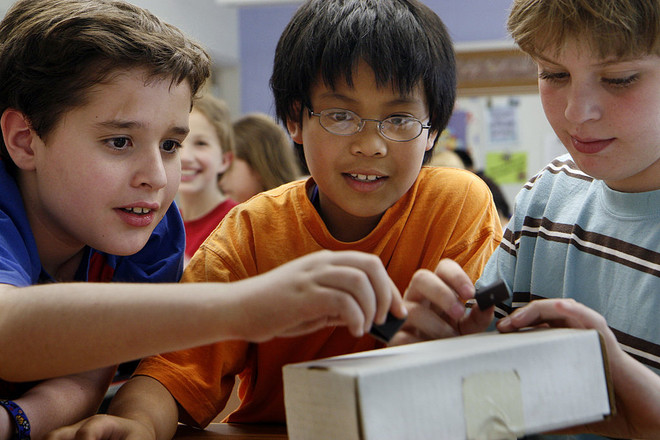Crisis of development and problems with upbringing
7 years is a transitional period in a child’s life.This is a difficult time for parents too. The baby starts to be capricious, does not want to obey the strict schedule and new rules. Against this background, disagreements and conflicts with elders arise. The child's emotions are so strong that it is difficult to cope with them on your own. Support the first-grader, help him adjust to the new rhythm. Attention and care are important for him now. A child at the age of 7 must be able to find a common languagewith classmatesPhoto: Getty At 7 years old the child is still difficult to sit in class, he complains of fatigue, a headache. This is a normal state, the brain becomes larger, the load increases, and the muscles of the hands are not yet fully strengthened. To alleviate all the symptoms, let the child have a rest, write down in the sports sections or walk more often in the fresh air. Do not forget about the vitamin complex. Physically, the child does not cease to develop, he loves climbing the rope, the Swedish wall, the ladder, playing with the ball, running and jumping on one leg. These classes are only for the benefit of the kid, but it is important to determine the time for them. Accustom a child to the regime, take time for homework and rest.
A child at the age of 7 must be able to find a common languagewith classmatesPhoto: Getty At 7 years old the child is still difficult to sit in class, he complains of fatigue, a headache. This is a normal state, the brain becomes larger, the load increases, and the muscles of the hands are not yet fully strengthened. To alleviate all the symptoms, let the child have a rest, write down in the sports sections or walk more often in the fresh air. Do not forget about the vitamin complex. Physically, the child does not cease to develop, he loves climbing the rope, the Swedish wall, the ladder, playing with the ball, running and jumping on one leg. These classes are only for the benefit of the kid, but it is important to determine the time for them. Accustom a child to the regime, take time for homework and rest.
What can a 7 year old child do around the house?
The first-grader is already old enough and can do small jobs around the house:
- helps to prepare simple meals;
- independently goes to the store;
- cares for animals;
- watering flowers.
Explain that self-care skills will be useful to him in the future. Help and guide, praise for the desire to help.
What should a first-grader know and be able to draw?
All skills and abilities in the 1st grade are improved. By the end of the year, the child will learn:
- names of planets, countries, cities, learns its address;
- full names of relatives and friends, dates of their birth;
- seasons, days of the week and months;
- mathematical signs «+» and «-», learn to use them;
- alphabet, numbers and figures;
- rules of conduct on the road, in school, at home.
If the child was well prepared, then there would be no problems.should not arise. Otherwise, do some extra work with him. Fine motor skills never stop developing. Children not only draw, but also carefully paint objects, apply even strokes, sculpt recognizable figures, put together complex puzzles, copy a drawing. Be attentive to the first-grader, do not be too demanding, do not force him to study, otherwise the desire and aspiration will disappear. Help him in the first classes, but teach him to be independent.









